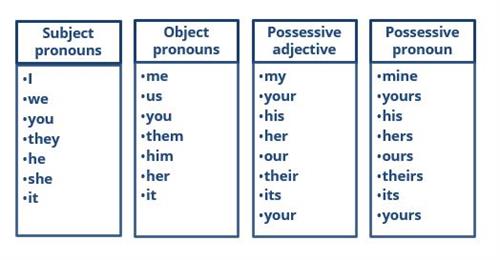
PUMPA - SMART LEARNING
எங்கள் ஆசிரியர்களுடன் 1-ஆன்-1 ஆலோசனை நேரத்தைப் பெறுங்கள். டாப்பர் ஆவதற்கு நாங்கள் பயிற்சி அளிப்போம்
Book Free DemoPronouns are words that are used to replace/substitute nouns. Pronouns help in avoiding repetition of the same names over and over again.
Example:
1. Mala lives in Chennai. Mala studies in class 8. Drawing and reading storybooks are Mala's favourite hobbies.
In the above sentences, instead of writing Mala (noun) repetitively, we can replace with pronouns called (she, her).
Now read the revised sentences.
Mala lives in Chennai. She studies in class 8. Drawing and reading storybooks are her favourite hobbies.
There are four kinds of pronouns:

Subject Pronouns are personal pronouns usually used as the subject of a verb.
Example:
1. I want to learn swimming.
2. We are going to a movie
3. They have reached the station
Object Pronouns are personal pronouns that replace a noun with an object.
Example:
1. Ram gave money to the poor man. He gave him some food also.
2. I will give you my laptop.
3. The story was written by me.
4. He taught us how to fly a kite.
Possessive Adjectives are used to express that something belongs to somebody. It is placed before a noun to show who/what owns it.
Example:
1. My dress is blue. (Noun is dress, and possessive adjective "my" is placed before the noun to show that I own it).
2. I'm playing with her dog.
3. This is their suitcase.
4. Our house is 4th on the left.
Possessive Pronouns are used to replace the possessive adjectives. These are words that demonstrate ownership.
Example:
1. The blue dress is mine.
2. The dog is hers.
3. This suitcase is theirs.
4. 4th house on the left is ours.
Some of the pronouns from the lesson "A Birthday Letter" are:
| S.No | Sentence | Pronoun |
1 | In history we read of great periods in the life of nations, of great men and women. | We (subject pronoun) |
2 | Men and women, and even little children, come out of their little shells and become India’s soldiers of freedom. | Their (possessive adjective) |
3 | I have written a very long letter to you. | I (subject pronoun) You (object pronoun) |
4 | My presents cannot be very material or solid. | My (subject pronoun) |
5 | He has helped to make the starving, the poor and the oppressed free and happy. | He (subject pronoun) |